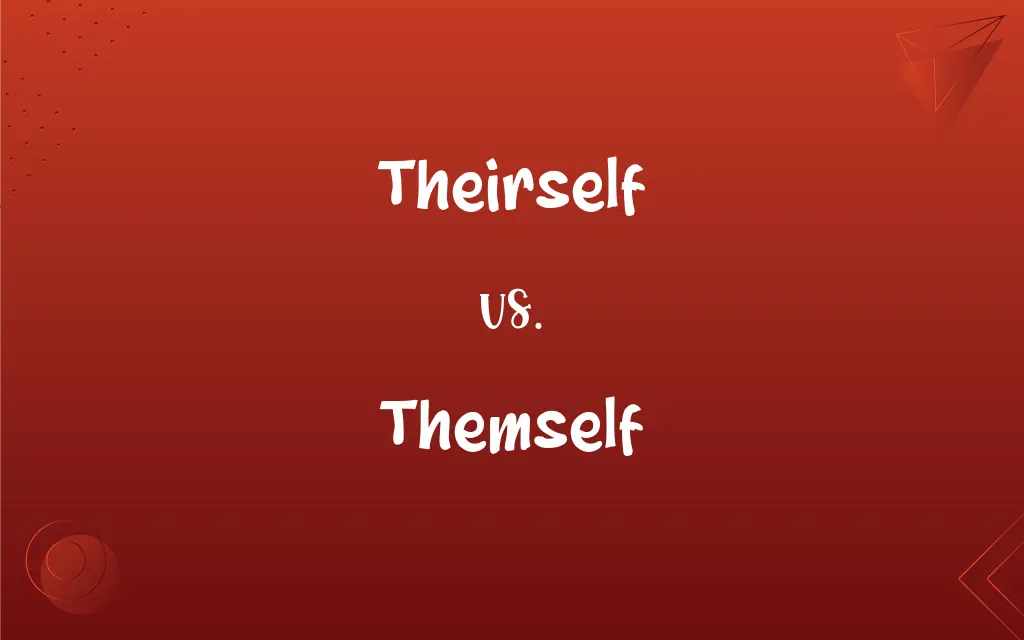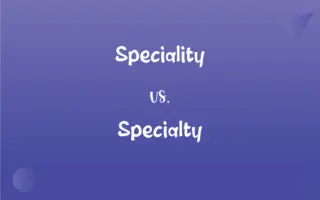Theirself vs. Themself: What's the Difference?
By Harlon Moss & Janet White || Updated on March 4, 2024
"Theirself" is a nonstandard reflexive pronoun that some might use for singular gender-neutral reference, while "themself" is increasingly accepted in formal contexts for referring to a singular person of unspecified gender.

Key Differences
"Theirself" and "themself" both emerge from the need to refer back to a singular antecedent using gender-neutral language. Traditionally, English uses "himself" or "herself" for singular reflexive pronouns, but these do not accommodate non-binary gender identities or cases where the gender is unknown or irrelevant. On the other hand, "themself" has gained traction and acceptance, especially as the use of singular "they" becomes more widespread. It serves the same purpose as "themselves" but is specifically used when referring to a single individual who does not identify as male or female, or when the gender is not specified.
The choice between "theirself" and "themself" reflects broader trends in language towards inclusivity and recognition of gender diversity. "Themself" is preferred in formal and edited contexts due to its growing acceptance and alignment with standard usage patterns. It is part of a larger movement towards gender-neutral language in English, accommodating the need for pronouns and reflexive pronouns that do not assume binary gender.
Usage of "themself" over "theirself" also parallels historical language shifts where informal or nonstandard forms become accepted over time through widespread use. This process illustrates language's dynamic nature, adapting to societal changes and the needs of its speakers. As language continues to evolve, the acceptance and usage of terms like "themself" highlight the community's role in shaping linguistic norms.
In digital communication, educational materials, and formal writing, the use of "themself" is a conscious choice to respect and acknowledge gender diversity. It represents a shift towards more inclusive language practices, recognizing the importance of language in reflecting and respecting individuals' identities.
Comparison Chart
Standardization
Considered nonstandard and less accepted.
Increasingly accepted in formal contexts.
ADVERTISEMENT
Usage Context
Rare, mostly in casual or dialectal English.
Used in formal and edited prose for singular "they".
Purpose
Attempts to provide a gender-neutral reflexive pronoun.
Recognized reflexive form of singular "they" for unspecified or non-binary gender.
Acceptance
Limited, with little formal recognition.
Growing acceptance among leading dictionaries and style guides.
Alignment with Singular "They"
Less aligned with current standard usage.
Directly aligns with the use of singular "they" as a gender-neutral pronoun.
Theirself and Themself Definitions
Theirself
A nonstandard reflexive pronoun for singular "they".
Someone left their book, they should claim it theirself.
ADVERTISEMENT
Themself
An accepted reflexive pronoun for singular "they".
Each guest can decide themself whether to attend.
Theirself
Attempts to fill a gap in gender-neutral language.
They used 'theirself' to avoid gendered pronouns.
Themself
Serves those who don’t identify as male or female.
Alex packed themself a lunch.
Theirself
Rarely used in formal writing.
You won't find 'theirself' in most academic papers.
Themself
Part of inclusive language practices.
Using 'themself' respects individual identity.
Theirself
Reflects the fluid nature of language.
Language evolves, and 'theirself' is an example of this.
Themself
Supported by dictionaries and style guides.
Modern dictionaries have entries for 'themself'.
Theirself
Seen in casual or dialectal English.
In conversation, someone might say 'theirself'.
Themself
Recognized in formal contexts.
Style guides now include 'themself' for gender-neutral reference.
Theirself
(nonstandard) themself.
Themself
(reflexive pronoun) The reflexive form of they, the third-person singular personal pronoun. The single person previously mentioned, as the object of a verb or following a preposition also used for emphasis.
Someone could hurt themself.
Anyone who wants a car like mine can buy one themself.
Theirself
(nonstandard) themselves.
Themself
Synonym of themselves.
FAQs
Is "themself" recognized by major dictionaries?
Yes, "themself" is recognized by leading dictionaries as a reflexive pronoun for singular "they."
What does the acceptance of "themself" say about English?
It indicates English's adaptability and its speakers' commitment to inclusivity and respect for all gender identities.
Can "theirself" be used in professional writing?
"Theirself" is considered nonstandard and is typically avoided in professional or formal writing.
How do "theirself" and "themself" reflect language change?
They exemplify language's evolution in response to societal changes, particularly regarding gender inclusivity.
Which is correct, "theirself" or "themself"?
"Themself" is increasingly accepted in formal contexts as the correct reflexive form of singular "they."
Why has "themself" become more accepted?
"Themself" aligns with the move towards gender-neutral language and the recognized use of singular "they."
Are there any guidelines for using "themself" in writing?
Many style guides now recommend "themself" for singular "they" references, especially in formal and edited prose.
Can "theirself" be considered grammatically correct?
While "theirself" is understood, it remains nonstandard compared to the more widely accepted "themself."
Is there a historical precedent for the singular "they" and "themself"?
Yes, the singular "they" and its variations, including "themself," have been used for centuries, with examples dating back to the Middle Ages, indicating a long-standing flexibility in English pronoun usage.
How do I choose between "theirself" and "themself"?
Choose "themself" for formal or professional contexts to align with current standards and inclusivity practices.
What are the implications of using "themself" in legal and official documents?
The use of "themself" in legal and official documents reflects and supports the recognition of gender diversity, ensuring language inclusivity in formal settings.
How does the use of "themself" impact language learning and teaching?
The acceptance of "themself" requires language educators to adapt teaching materials and practices to include and normalize gender-neutral language, promoting inclusivity among learners.
Can the use of "themself" vary by region or country?
While "themself" is becoming more universally accepted due to global discussions on gender inclusivity, regional variations in acceptance and usage might still exist, reflecting local linguistic norms and attitudes towards gender identity.
Are there any notable public figures or campaigns that have championed the use of "themself"?
Various LGBTQ+ advocates, educators, and some celebrities have promoted the use of gender-neutral language, including "themself," contributing to its visibility and acceptance.
Will "theirself" ever become standard English?
Language trends suggest "themself" is more likely to be standardized, but language evolution is unpredictable, and user practices play a significant role.
What role do publishers and media outlets play in the standardization of "themself"?
Publishers and media outlets, by adopting "themself" in their style guides and publications, can significantly influence public acceptance and contribute to its standardization in written English.
How do educators and style guides recommend addressing non-binary pronouns and reflexives?
Educators and style guides increasingly recommend using "they/them/their/themself" as gender-neutral singular pronouns and reflexives to respect and acknowledge non-binary and gender-nonconforming individuals.
How do digital platforms and social media influence the acceptance of "themself"?
Digital platforms and social media play a significant role in normalizing "themself" by providing spaces for diverse voices and accelerating the spread of inclusive language practices.
How might the acceptance of "themself" evolve in the next decade?
Given current trends towards inclusivity and recognition of non-binary identities, it is likely that "themself" will become even more widely accepted and used, possibly becoming a standard part of English grammar.
What challenges might writers face when choosing between "theirself" and "themself"?
Writers may grapple with ensuring their language is both inclusive and adheres to the preferred style of their audience or publication, balancing between grammatical tradition and evolving language norms.
About Author
Written by
Harlon MossHarlon is a seasoned quality moderator and accomplished content writer for Difference Wiki. An alumnus of the prestigious University of California, he earned his degree in Computer Science. Leveraging his academic background, Harlon brings a meticulous and informed perspective to his work, ensuring content accuracy and excellence.
Co-written by
Janet WhiteJanet White has been an esteemed writer and blogger for Difference Wiki. Holding a Master's degree in Science and Medical Journalism from the prestigious Boston University, she has consistently demonstrated her expertise and passion for her field. When she's not immersed in her work, Janet relishes her time exercising, delving into a good book, and cherishing moments with friends and family.































































